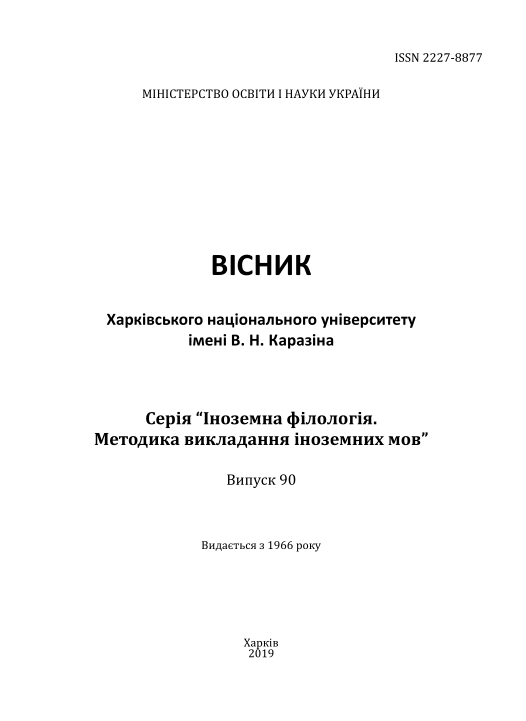Subject’s Roles in the Non-Cooperative Type of Communicative Situation “Talk of Friends”
Abstract
Communicative situation “Talk of Friends” is the only one to represent discourse of friendship. This presupposes that discourse subject’s role is that of FRIEND in its different varieties. However, talk of friends is not always of cooperative nature. In case of non-cooperative character it embraces two subtypes, namely: potentially conflicting and conflicting. In the first case the dialogue participants face a threat to their friendship, in the second case their talk puts an end to it. This article aims at establishing the role infrastructure for both subtypes of the uncooperative type of the communicative situation “Talk of Friends”. Approaching discourse subject as that of mental, communicative and verbal activity results in analyzing each role in the cognitive and communicative aspects and as for the means of its verbal manifestations. The research data analysis gives grounds to argue that the subject roles, proper to the potentially conflicting situation subtype, are friend critic and indifferent friend. The role friend critic is implemented with the communicative aim to reveal the drawbacks of a friend, so that he/she could get rid of them, it is realized by negative evaluative utterances and often combines with the role friend adviser in a dialogue. The role indifferent friend aims at distancing from the other through denying him/her of help, sympathy etc. Non-specific utterances of refusal and disagreement serve to realize this role. In the conflicting non-cooperative situation “Talk of Friends” the role NOT A FRIEND is the only one of the discourse subject, who explicitly/implicitly informs the other about the end of their friendship because of the negative evaluation of the other or himself/herself. Each of the roles is implemented on the basis of the corresponding scenario.
Downloads
References
Aleksieieva, I. O. (2012). Konfrontatsiini taktyky mizhosobystisnoho konfliktu [Confrontational Tactics of Interpersonal Conflict]. Linhvistyka XX stolittia: novi doslidzhennia i perspektyvy – Linguistics XX of the century: new studies and prospects, 21–30 (in Ukrainian).
Balatska, O. L. (2013). Dyskursyvni vlastyvosti krytyky v anhlomovnii naukovii statti. Avtoref. diss. kand. filol. nauk [Discursive Properties of Criticism in ResearchArticles in English. Cand. philol. sci. diss. synopsis]. Kharkiv (in Ukrainian).
Frolova, I. Ye. (2013). Subiekt yak chynnyk dyskursyvnoi diialnosti [Subject Factor in Discoursive Activity]. Visnyk Kharkivskoho natsionalnoho universytetu imeni V. N. Karazina – V. N. Karazin Kharkiv National Univ. Messenger, 1051, 106-111 (in Ukrainian).
Hrydasova, O. I. (2010). Osoblyvosti aktualizatsiyi stereotypnykh roley v anhlomovnomu simeynomu konfliktnomu dyskursi Avtoref. dyss. kand. filol. nauk [Characteristic Features of Stereotypical Roles Actualization in the English Speaking Family Conflict Discours. Cand. philol. sci. diss. synopsis]. Kharkiv (in Ukrainian).
Karasik, V. I. (2002). Jazyk social'nogo statusa [The Language of the Social Status]. Moskva: ITDGK "Gnozis". (in Russian).
Musaieva, R. Sh. (2015). Osoblyvosti aktualizatsii roli Druh-Pryiemnyi spivrozmovnyk u sytuatsii «Besida Druziv» [The peculiarities of actualization of the role FRIEND-GOOD COMPANY in the situation “Talk of Friends”]. Visnyk Kharkivskoho natsionalnoho universytetu imeni V. N. Karazina – V. N. Karazin Kharkiv National Univ. Messenger, 81, 119–125. (in Ukrainian).
Musaieva, R. Sh. (2017). Diapazon rolei u nekooperatyvnii komunikatyvnii sytuatsii «Besida Druziv» [The Range of Roles in the Non-cooperative Communicative Situation “Talk of Friends”]. Karazinski chytannia: Liudyna. Mova. Komunikatsiia: XVI. mizhnar. nauk. konf., 3 liutoho 2017 roku.: tezy dop. [Karazin Readings: Person. Language. Communication: XVI international scientific conference, 3 February, 2017: abstracts]. Kharkiv, 84–85.
Musayeva, R. (2015) Riznovydy komunikatyvnoyi sytuatsiyi «Besida druziv» [Types of communicative situation, «the Conversation of Friends»]. Suchasna anhlistyka: do 85-richchya kafedry anhliys'koyi filolohiyi: Shostyy mizhnar. naukovyy forum – Modern Anglistics: marking the 85th anniversary of the department of English philology: the Sixth internat. scientific forum, on 23 September, 2015: abstracts. Kharkiv, 89–91.
Musayeva, R. Sh. (2014) Dyskursyvni vlastyvosti komunikatyvnoyi sytuatsiyi «DRUZhNYa BESIDA» [The discursive properties of the communicative situation "FRIENDLY CONVERSATION"]. Visnyk Kharkivs'koho natsional'noho universytetu imeni V. N. Karazina – V. N. Karazin Kharkiv National Univ. Messenger, 1124, 137–143. (in Ukrainian).
Spravzhnya druzhba [True friendship]. Available at: http://www.ukrlit.vn.ua/making1/6pv1f.html.




